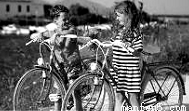题目内容
When I was ten my dad helped me buy my first ten-speed bicycle from Allen.I put up $60 of my grass cutting and snow shoveling (铲) money and my dad put up the other half I would pay him back over the next six months.Although it was not in the latest style, it was my ticket to the adult world.
I spent that summer and autumn riding happily.My sister Liz, a prisoner(囚犯,俘虏) of her five-speed bicycle, never had a chance to keep up.Just before the Christmas deadline to pay my dad back, we were hit with several snowstorms.This allowed me to shovel enough driveways (车道) to pay off my debt.I was now officially a bike owner; it was a feeling unlike any other.
On that Christmas morning, my dad gave me a used portable (便携式的) record player.I was excited.However, my joy was short-lived after my dad called my sister to the kitchen.“We have one more gift for you.” he said as he opened the door that led to the garage.There, on the steps, stood a new ten-speed bicycle.
“It’s not fair,” I complained.“I worked so hard for my bike.and it’s not even new.Then Liz gets a new bike.She didn’t have to do anything for it.” My dad smiled.“She didn’t have to do anything for it because it’s not really for her,” he said.What did that mean? I didn’t want her bike.
By spring Liz and I were riding all over town together now that she could keep up.As we grew, Liz and I became true friends.
Still I wasn’t smart enough to figure out what my dad meant until years later.That new bike was not a gift for Liz — it was a gift for me.He’d given me the gift of my sister’s company, the ability to stay together rather than drift apart (逐渐疏远) in the face of my ability to travel.He gave me my best friend.

1.What do we know about the author’s bike?
A.It was worth $120.
B.Allen bought it for him.
C.It was very fashionable.
D.He didn’t like it actually.
2.Why did the author think he was officially a bike owner?
A.He had paid off his debt.
B.He had learned to ride a bike.
C.He could also own Liz’s bike.
D.He could sell his bike to Liz.
3.Why was the author’s Christmas joy short-lived?
A.His sister got a new record player.
B.His father didn’t care about him.
C.The record player wasn’t new.
D.His sister got a better gift.
4.Hearing his father say “it’s not really for her (Paragraph 4)”, the author probably felt ________.
A.moved B.satisfied
C.puzzled D.disappointed
1.A
2.A
3.D
4.C
【解析】
试题分析:本文讲述我和妹妹在圣诞节收到了父亲给的不同的礼物,我当时觉得很不公平,随着年岁的增长,我发现父亲实际送给我了最为珍贵的礼物——妹妹的陪伴、与人亲近沟通的能力及最好的朋友。
1.I put up $60 of my grass cutting and snow shoveling (铲) money and my dad put up the other half I would pay him back over the next six months. 可知,我用铲草和铲雪的钱付了60美元,另一半是我父亲付的,我要在接下来的半年里还他。所以我的车子是120美元,故选A
2.This allowed me to shovel enough driveways (车道) to pay off my debt.I was now officially a bike owner可推知,在付清欠父亲的钱之后,我才觉得自己是车子的正式主人,故选A
3.“It’s not fair,” I complained.“I worked so hard for my bike.and it’s not even new.Then Liz gets a new bike.She didn’t have to do anything for it.” Liz 得到了一辆新自行车,她并没为此做出任何努力,所以我觉得不公平,而这种情绪终结了“我”圣诞节的快乐,故选D
4.What did that mean? I didn’t want her bike.那是什么意思,我并不想要她的自行车,可知,当时,我是不明白父亲的用意的,应是迷惑的,故选C
考点:考查记叙文阅读
